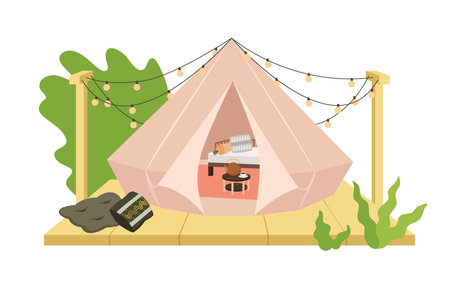1. Setting the Scene: The Modern British Gourmet Camp Cook
Gone are the days when camping in the UK meant settling for soggy beans on toast or instant noodles. Today, a new wave of British campers is raising the bar by embracing gourmet cooking under canvas. Whether pitching up in the Lake District or along the Cornish coast, these modern camp cooks are bringing quality ingredients and culinary flair to Britain’s wild spaces. Popular British staples such as locally cured bacon, Lincolnshire sausages, mature Cheddar, and even fresh seafood from local markets now make regular appearances at campsite kitchens. However, this rise in alfresco fine dining comes with its own set of challenges—chief among them being how to safely store and transport perishable goods without access to home comforts like fridges or pantries. The unpredictable UK weather, limited space, and keeping food fresh for several days all require clever planning and practical solutions. For today’s British foodie camper, mastering portable storage is just as essential as perfecting that show-stopping campfire stew.
Menu Planning: Classic and Contemporary British Dishes
When planning a gourmet camping menu, striking the right balance between beloved British comfort food and elevated modern cuisine is key. Not only does this keep meals interesting, but it also ensures everyone at camp has something familiar and exciting to look forward to. Below are practical tips for creating a well-rounded menu that’s both satisfying and suited to the outdoors.
Tips for a Balanced Camping Menu
- Blend Tradition with Innovation: Pair classic dishes like sausage & mash or Cornish pasties with contemporary twists such as smoked mackerel pâté or wild garlic risotto.
- Focus on Prep-Friendly Ingredients: Opt for items that require minimal on-site preparation. For example, pre-marinate meats at home or bring along pre-chopped veg in sealed containers.
- Think Portability: Select recipes that travel well and can withstand changing temperatures—think oatcakes, cured meats, or cheese paired with chutney.
- Accommodate Dietary Needs: Offer vegetarian and gluten-free options like roasted root veg salads or grilled halloumi wraps to keep all campers happy.
Example Menu: Classic Meets Modern British
| Meal | Classic Option | Contemporary Option | Prep & Portability Notes |
|---|---|---|---|
| Breakfast | Bacon butties | Smoked salmon & avocado bagels | Bread & fillings pack well; assemble fresh at camp |
| Lunch | Cornish pasty | Lentil & beetroot salad pots | Pasties stay fresh wrapped; salads pre-packed in jars |
| Dinner | Bangers & mash (pre-cooked sausages) | Lamb kofta skewers with minted yoghurt dip | Sausages reheat easily; koftas pre-shaped, cook over fire |
| Dessert | Eton mess (meringue bits, berries) | Campfire-baked apples with spiced oats | Meringue keeps well; apples pre-stuffed, foil-wrapped for fire baking |
Top Tip:
Use stackable, airtight tubs and reusable silicone bags to organise ingredients by meal—this saves time and avoids cross-contamination. Don’t forget a cooler bag for dairy and meats!

3. Cool Boxes, Crates and Clever Containers: Choosing Your Storage Gear
When it comes to planning a gourmet camping menu in the unpredictable British outdoors, your food storage strategy can make or break your culinary ambitions. With ever-changing weather, curious wildlife, and limited space in tow, UK campers need gear that’s robust, reliable and ready for anything. Here’s a practical review of top storage options, with tips to keep your ingredients fresh and your packing streamlined.
Weatherproof Cool Boxes: The British Essential
For any serious camp cook, investing in a high-quality cool box is non-negotiable. Look for models with thick insulation and sturdy seals—brands like Outwell and Coleman are popular in the UK for their ability to keep food chilled even through an unexpected heatwave or classic British drizzle. Electric cool boxes are great if you’ve got access to mains hook-up, but passive models are ideal for off-grid adventures. Always pre-chill your cool box before use, and pack it tight with reusable ice blocks for maximum efficiency.
Stackable Crates: Space-Saving Heroes
Stackable plastic crates are perfect for keeping dry goods organised and protected from damp grass or muddy ground. Opt for weather-resistant crates with clip-on lids—these not only save precious boot space but also double as makeshift tables or extra seating around the firepit. Labelling each crate by meal type (breakfast, lunch, dinner) helps streamline cooking and minimises rummaging when the rain starts pouring.
Clever Containers: Airtight and Versatile
Airtight containers are a must for storing everything from marinated meats to delicate herbs. BPA-free plastic or stainless steel options are best; they’re lightweight, durable, and won’t absorb odours. For UK trips where sudden showers are a given, waterproof dry bags can be a lifesaver—use them for bread, snacks or anything that needs extra protection from moisture.
Pro Packing Tip:
Keep a small container dedicated to kitchen essentials such as olive oil, spices and tea bags—you’ll thank yourself when it’s time for a quick brew under grey skies!
Final Thoughts
With the right combination of cool boxes, stackable crates and airtight containers, you can elevate your British camping cuisine while keeping everything tidy and safe from the elements. Choose quality over quantity; well-chosen storage gear means less faff and more time enjoying those gourmet lakeside suppers.
4. Keeping it Fresh: Managing Perishables and Food Safety
Cooking gourmet meals in the great British outdoors is a real treat, but our famously unpredictable weather and varied terrain can make keeping ingredients fresh quite the challenge. To help you maintain food quality and safety while camping, here are some practical strategies tailored to UK conditions—from maximising natural cooling to preventing cross-contamination.
Smart Cooling Solutions for British Campsites
British summers can swing from blazing sun to a sudden chilly breeze, so it’s wise to combine modern tools with Mother Nature’s own resources:
| Method | Best For | How It Works |
|---|---|---|
| Ice Packs & Cool Boxes | Dairy, meats, salads | Pre-chill packs at home; keep boxes shaded and unopened as much as possible |
| Natural Water Cooling | Bottled drinks, sealed perishables | Submerge watertight containers in cold streams or rivers, if safe and permitted |
| Evaporative Cooling Bags | Fruit, veg, cheeses | Use canvas or mesh bags dampened with water; hang in breezy shade for best effect |
| Car Boot Storage Overnight | All perishables | Parked car boots can be cooler than tents during cold nights—just remember to remove food early before the sun warms things up! |
Tackling Cross-Contamination Outdoors
The key to safe al fresco cooking is preparation. Here are some tried-and-tested tips for British camp cooks:
- Separate Everything: Bring colour-coded chopping boards (red for raw meat, green for veg) and use separate utensils for each group of ingredients.
- Pack Smart: Store raw meats in leak-proof containers at the bottom of your cool box to prevent drips onto other foods.
- Hand Hygiene: Always pack anti-bacterial gel and biodegradable soap—rainwater or stream water alone isn’t enough for clean hands after handling raw food.
- Sensible Leftovers: If the British sun makes an appearance and leftovers have been out more than two hours, it’s safest to bin them rather than risk a dodgy tummy.
Clever Packing Tips for UK Terrain
If you’re trekking through the Lake District or pitching up on the Cornish coast, consider these extra tricks:
- Avoid Overpacking Coolers: Leave space for cold air circulation. Tightly packed boxes warm up faster.
- Shelter Your Storage: Use hedgerows or stone walls as natural windbreaks and shade providers to keep coolers away from direct sunlight.
- Stay Off the Ground: British soil can be damp even on dry days—elevate storage using crates or logs to prevent condensation under your boxes.
Your Gourmet Camp Menu, Kept Safe and Delicious
A little forward planning goes a long way in Britain’s wild places. With the right mix of portable tech and old-fashioned savvy, you can keep your ingredients fresher for longer—and enjoy every bite without worry. Next time you’re planning your gourmet camping menu, don’t forget these simple but effective storage strategies!
5. Prepping Like a Pro: Smart Packing and Portioning Solutions
If you want to pull off a gourmet camping feast without the faff, seasoned British camp cooks swear by strategic prepping and portioning. Proper planning not only saves time but also ensures you’re not lugging unnecessary extras or wasting food in the wilds. Here’s how to prep like a pro for your next outdoor culinary adventure.
Batch Prepping: The Key to Quick Gourmet Meals
Batch prepping is a game-changer for campers who refuse to settle for bland grub. In true British fashion, think hearty stews, marinated meats, or even full English breakfast components—prepared at home and packed ready-to-go. Chop veg, pre-cook grains, and assemble spice blends in advance; this way, you spend less time faffing about at the campsite and more time enjoying the scenery (or the pub if you’re near one!).
Vacuum Sealing: Fresher Food, Less Fuss
Vacuum sealing has become increasingly popular among UK camping enthusiasts. By removing air from your packs, you not only save valuable rucksack space but also keep food fresher for longer—ideal for extended trips in unpredictable British weather. From salmon fillets caught in Scottish rivers to cheese slices for ploughman’s sandwiches, vacuum-sealed portions prevent leaks and keep ingredients tasting their best.
Top Tip:
Label each sealed bag with its contents and the date prepared—no more mystery meals when you’re rummaging through your coolbox!
Portion Control: Minimise Waste, Maximise Enjoyment
No one wants to carry leftovers back home (especially when hiking across Yorkshire moors). Experienced British camp cooks recommend dividing meals into single or double servings before packing. Use reusable silicone bags or sturdy containers that stack neatly in your esky. This not only makes meal times smoother but also helps with calorie planning if you’re doing active pursuits like cycling or climbing.
Insider Insight:
For group trips, assign colour-coded containers for each camper—a nifty hack to avoid confusion and ensure everyone gets their fair share of sticky toffee pudding or Cornish pasties.
By embracing these prepping strategies—batch prepping, vacuum sealing, and smart portioning—you’ll elevate your camp kitchen game while keeping waste and effort to a minimum. With everything sorted ahead of time, all that’s left is to fire up the stove and tuck in!
6. Cooking on Location: Tools and Techniques for British Campsites
When it comes to preparing a gourmet camping menu in the UK, choosing the right cooking equipment can make or break your culinary ambitions. The unpredictable British weather and varying campsite facilities demand flexibility, so a compact, versatile cooking kit is your best ally. Here are some recommendations and techniques tailored specifically for camp cooks across the UK.
Essential Compact Cooking Kit
Invest in a lightweight, nesting cookware set—preferably stainless steel or hard-anodised aluminium—to save space without compromising durability. A foldable multi-fuel stove is ideal for most British campsites, as it works efficiently even in damp conditions. Don’t forget a sturdy grill rack, which can be set over open fires or portable stoves alike. For utensils, opt for heat-resistant silicone spatulas and tongs, and a sharp, folding chef’s knife with a safety lock.
Mastering the Open Fire
There’s nothing more satisfying than cooking over an open fire in the wilds of Wales or Scotland. Use firelighters and dry kindling to get things started, especially if recent rain has left wood damp. Cast iron pans excel here—they distribute heat evenly and develop brilliant flavourful crusts on everything from sausages to flatbreads. Remember to check local rules on open fires; some sites require raised fire pits or ban ground fires entirely.
Portable Stoves: Quick & Reliable
For English countryside weekends or Scottish bothy stays where open flames aren’t practical, portable gas stoves are a British camper’s go-to. Dual-burner models allow you to simmer sauces whilst boiling potatoes for mash—efficiency at its finest! Always bring extra gas canisters (weather can affect fuel consumption) and windshields to maintain an even flame in blustery conditions.
Campfire Ovens: Gourmet Ambitions
If you’re feeling adventurous, try a portable campfire oven or Dutch oven for baking rustic breads or cobblers. These ovens sit directly in embers or atop portable stoves and are surprisingly effective for roasting veg, slow-cooking stews, or even baking scones—a nod to classic British comfort food.
Practical Tips for UK Camp Cooks
Keep your kit organised with labelled storage bags, and pack cleaning gear like collapsible washing-up bowls and eco-friendly soap. Plan meals that use overlapping ingredients to cut down on what you need to carry. Finally, always respect local wildlife regulations and leave no trace—pack out all rubbish and thoroughly extinguish fires before leaving your pitch.
7. Real-World Examples: Tried-and-Tested Menus and Storage Tactics
If you want to avoid soggy sarnies or spoiled sausages, nothing beats learning from fellow British campers who’ve mastered the art of gourmet eating in the great outdoors. Below are a few case studies and anecdotes that reveal both smart successes and classic pitfalls—so you can pitch up with confidence and cook like a pro.
The Lake District “Sunday Roast” Success
Hannah, a self-proclaimed foodie from Manchester, recounts how her group pulled off a full roast dinner by pre-cooking beef at home, then vacuum-sealing slices for transport. “We kept everything cold in a cool box packed with ice blocks, and used insulated flasks for gravy,” she says. The biggest win? “Roast potatoes finished on the campfire grill—crispy perfection!” Hannah warns, however, against bringing glass condiment jars: “One smashed in my rucksack—never again! Decant into lightweight plastic bottles instead.”
Cornwall Coastal Picnics—Fresh Fish Done Right
Tom and Lila, frequent campers on the Cornish coast, share their go-to menu: line-caught mackerel cooked within hours of being caught. Their secret is a portable cool bag layered with reusable ice packs and separate waterproof pouches for fillets. “We tried wrapping fish in newspaper once—bad idea, it got soggy and leaked everywhere,” Tom laughs. Now, they swear by silicone bags: “No leaks, easy wash-up.” Their top tip? Always bring extra zip-lock bags for leftovers—the sea air makes everyone hungrier than expected!
The Scottish Highlands Vegetarian Challenge
Megan’s all-veggie crew faced damp weather and limited refrigeration near Loch Lomond. Her solution was prepping falafel mix and couscous at home, then storing them in airtight tubs. “The falafels held up well in the chilly weather,” Megan notes. She learned the hard way to avoid fresh greens unless eaten on day one: “They wilted fast, so we switched to roasted peppers and tinned beans for salads after that.” Her advice: prioritise robust veg and pulses over leafy greens for longer trips.
Lessons Learned: What Didn’t Work
No round-up would be complete without some cautionary tales. Several campers mentioned trying to bring soft cheeses like Brie or Camembert without enough cooling—these turned into unpleasant puddles before dinner. Others regretted packing eggs loosely; after one too many cracked shells, most now use specialised plastic egg carriers or hard containers. And nearly everyone agrees: don’t rely solely on supermarket cool bags for more than 24 hours—proper ice blocks or even frozen water bottles are essential if you’re staying out longer.
Takeaway Tips from Seasoned Camp Cooks
Across all these stories, three points stand out: plan menus around what stores and travels well; invest in decent storage gear (think insulated bags, leakproof boxes); and always expect the unexpected—rain or shine. By learning from those who’ve braved Britain’s wilds with their spatulas and spice kits, you’ll set yourself up for campsite meals worth remembering—and repeating.


